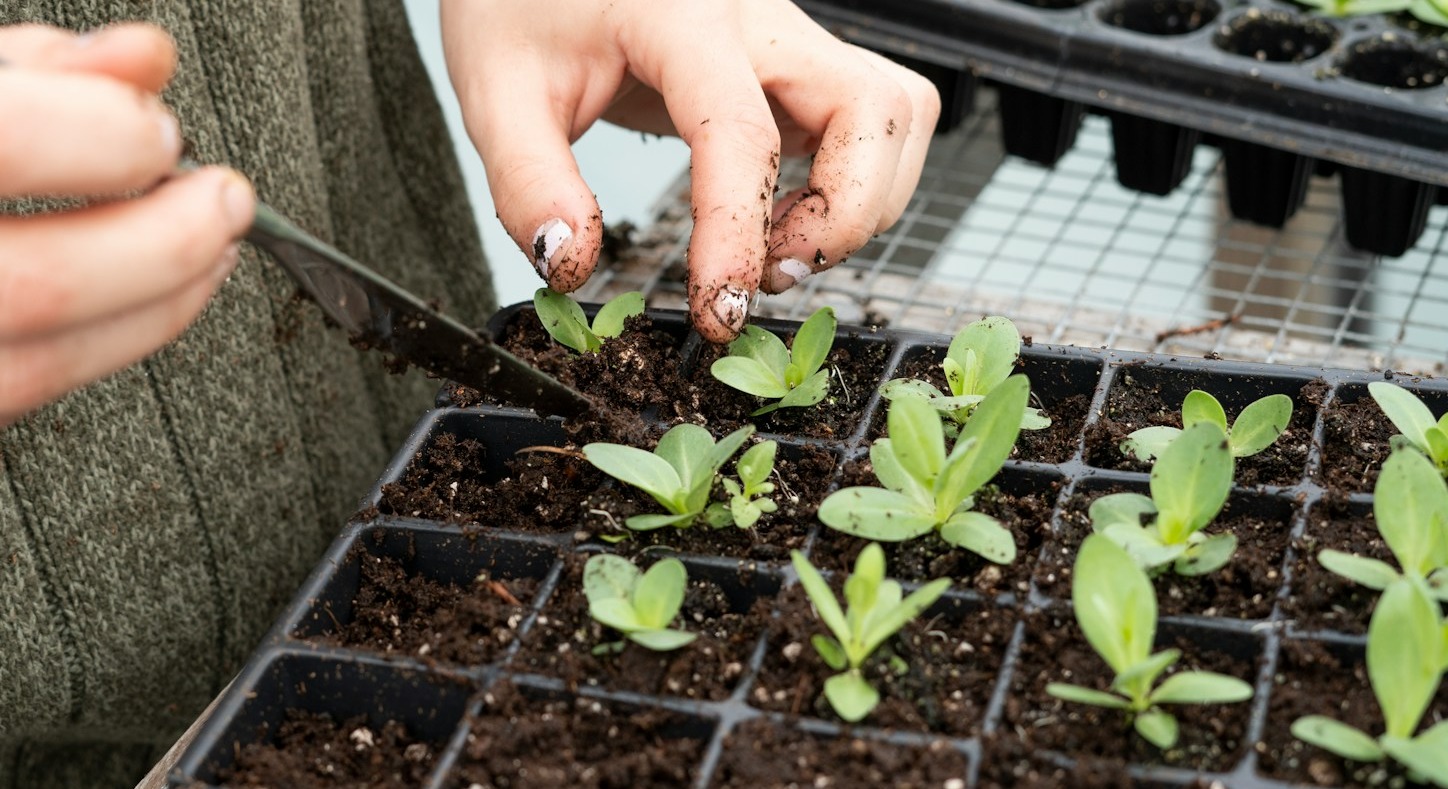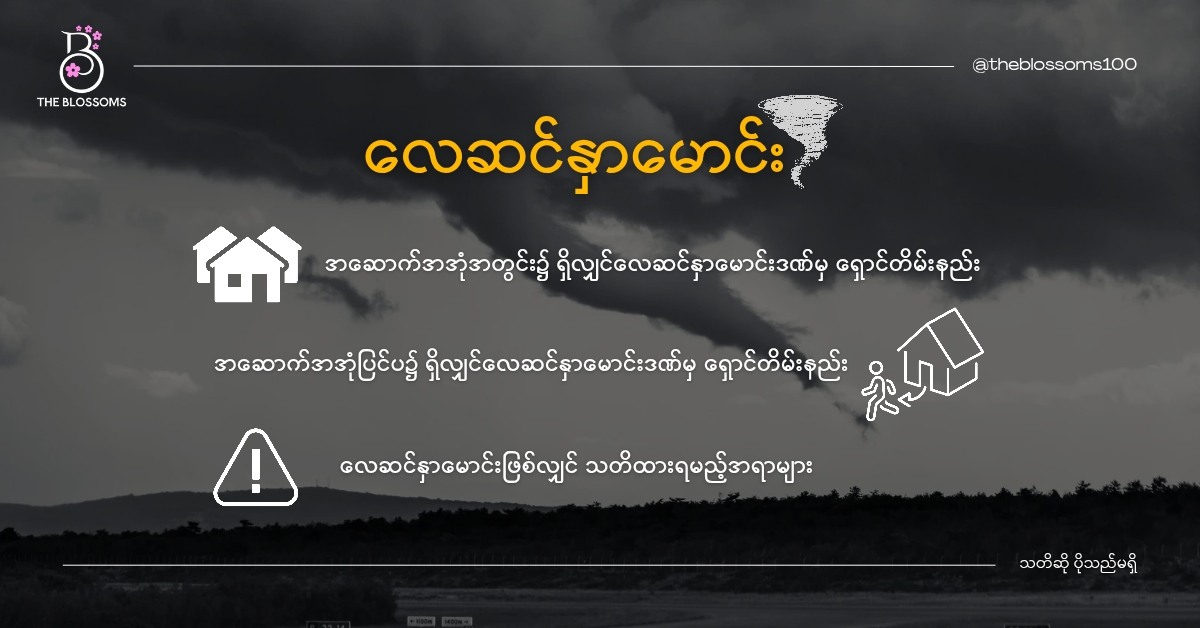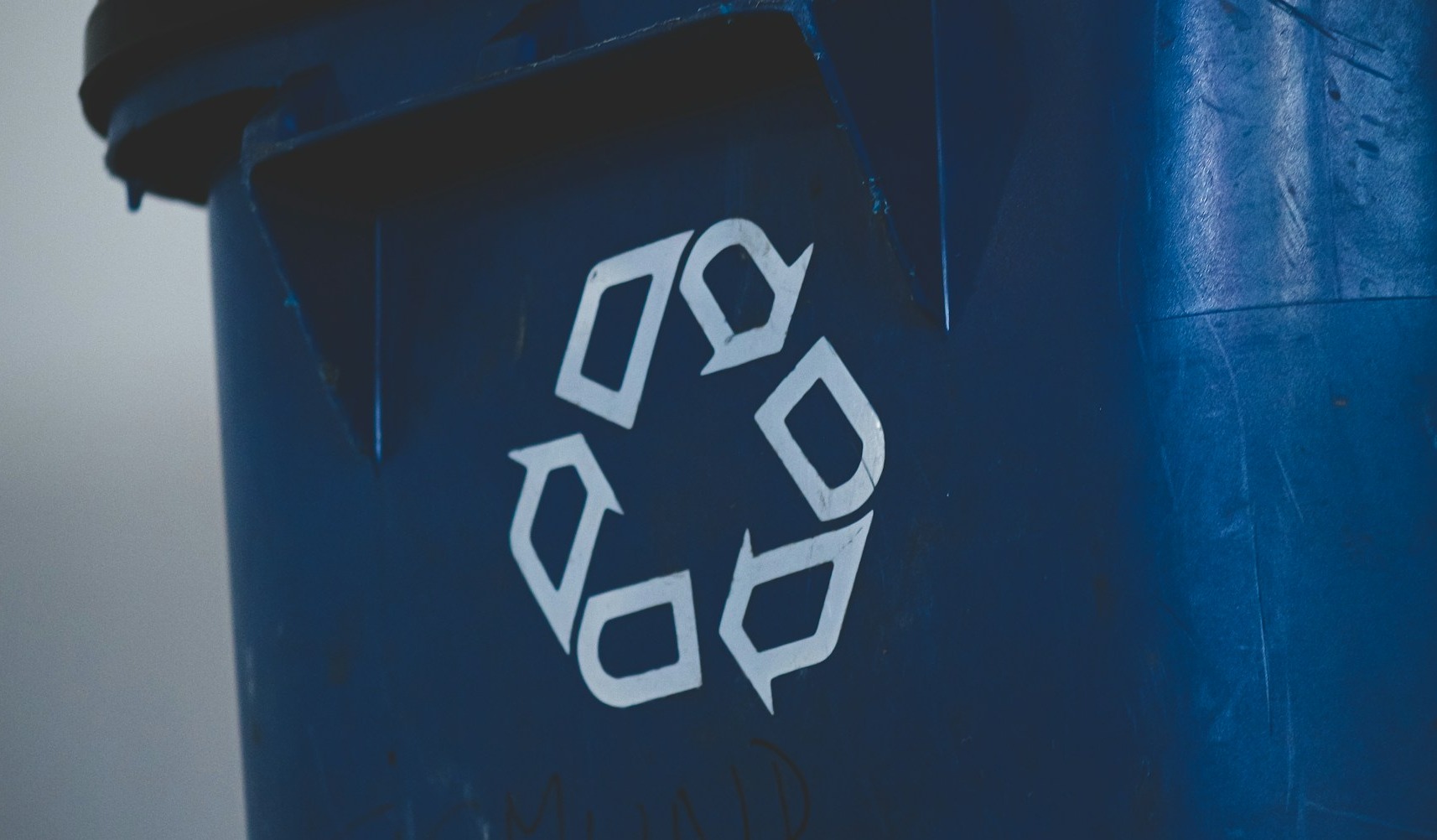သဘာဝပတ်ဝန်းကျင်ကို ဖျက်ဆီးနေတဲ့အရာအများစုဟာ သင်နဲ့ သင့်ပတ်ဝန်းကျင်မှ ထွက်ပေါ်လာတယ်ဆိုတာ သတိထားမိရဲ့လား?
ဒါဆိုရင်တော့ ကိုယ်ပြုလုပ်နေတဲ့ ဘယ်အပြုအမူလေးတွေကို ပြင်ဆင်သင့်နေပြီလဲဆိုတာ ကြည့်လိုက်ရအောင်.....
1. လောင်စာဆီများ အလွန်အကျွံ သုံးစွဲခြင်း
ကျွန်မတို့ရဲ့ နေ့စဉ်ဘဝမှာ များသောအားဖြင့် အနီးအနားကို သွားမယ်ဆိုရင်တောင် ဆိုင်ကယ်၊ ကား တို့ကိုအသုံးပြုဖို့ ဝန်မလေးကြပါဘူး။
ဒီလိုသာမာန်ရွေးချယ်မှုလေးက ကမ္ဘာကြီးကို ဘယ်လောက်ထိ ထိခိုက်သွားစေလဲ။
မော်တော်ယာဉ်တွေ လောင်စာဆီလောင်ကျွမ်းရာမှ carbon monoxide အပြင် nitrogen dioxide နဲ့ သေးငယ်ပေမယ့် အဆိပ်ပြင်းတဲ့ PM2.5 (Particulate matter) တို့ထွက်ရှိပါတယ်။
Carbon monoxide နဲ့ nitrogen dioxide တို့က လေထဲမှာရှိတဲ့ oxygen ၊ ရေငွေ့၊ ဆီးနှင်း၊ မိုးရေစတာတွေ နဲ့ရောစပ်ပြီး အက်ဆစ်မိုးအဖြစ် ကမ္ဘာမြေပေါ်ပြန်ကျတဲ့အခါ အပင်နဲ့ကောက်ပဲသီးနှံတို့ကို ပျက်စီးစေတယ်။ မြစ်ချောင်းများကို ညစ်ညမ်းစေပြီး ရေနေသတ္တဝါတို့ကို သေကြေပျက်စီးစေပါတယ်။ ဒါ့အပြင် တိုက်တာအဆောက်အဦနဲ့ လူတို့ရဲ့ကျန်းမာရေးအထိ ထိခိုက်လာနိုင်ပါတယ်။
PM2.5ဟာလည်း လေထုကိုညစ်ညမ်းစေရုံသာမက လူတွေရဲ့ ကျန်းမာရေးကိုလဲ ဆိုးရွားစွာထိခိုက်စေပါတယ်။
ဒါကြောင့် မိမိတစ်ကိုယ်ရည် သက်သာမှုလေးကို မမက်မောဘဲနဲ့ စက်ဘီးစီးတာ၊ လမ်းလျှောက်တာ၊ အများသုံးယာဉ်တို့ကို အစားထိုးအသုံးပြုသင့်နေပါပြီ။
2. နှစ်ခါမစဉ်းစားပဲ သုံးမိလိုက်သော ပလတ်စတစ်များ
ပလတ်စတစ်တွေရဲ့ဆိုးကျိုးကို လူတိုင်းလက်ခံကြပေမယ့် လက်တွေ့မှာတော့ သုံးနေကြတုန်းပါပဲ။ ကိုယ်သုံးလိုက်တဲ့ ပလတ်စတစ်အိတ်တွေက ပတ်ဝန်းကျင်ညစ်ညမ်းရုံနဲ့ရော ပြီးသွားပြီလား။ ဒါတင်မကသေးပါဘူး။
ပလတ်စတစ်အမှိုက်တွေ များလာတဲ့အခါ ရောဂါသယ်လာမယ့် ကြွက်တွေနဲ့ ပိုးမွှားတွေ ပေါများလာမယ်။
ဆွေးမြေ့ဖို့ နှစ်ပေါင်း ၄၅၀ ကြာမြင့်တာကြောင့် မြေဆီလွှာထဲနစ်ဝင်ပြီး မြေထုကိုညစ်ညမ်းစေတယ်။
မြစ်၊ ချောင်းအတွင်းကျတဲ့အခါမှာလည်း ရေထုကိုညစ်ညမ်းစေရုံမက ရေနေသတ္တဝါတို့အတွက်လဲ ကြီးမားတဲ့ အန္တရာယ်ဖြစ်စေနိုင်ပါတယ်။ ၂၀၁၈ ခုနှစ်မှာ ဝေလငါးငယ်တစ်ကောင်ရဲ့ကိုယ်တွင်းမှ ပလတ်စတစ် ၃၂ ကီလို တွေ့ရှိခဲ့ရပါတယ်။
ပလတ်စတစ်ကို တီထွင်ခဲ့တဲ့ ပညာရှင်ဟာ တီထွင်ပြီးပြီးချင်းမှာပဲ ပြန်ဖျက်ဆီးဖို့ ကြိုးစားခဲ့ပေမယ့် မအောင်မြင်ခဲ့ပါဘူး။ အခုချိန်မှာတာ့ ပလတ်စတစ်က ကမ္ဘာကြီးကို လွမ်းမိုးနေပြီဖြစ်တာကြောင့် ပြန်လည်ကယ်တင်ရမှာ လူသားတို့ရဲ့ တာဝန်ဖြစ်လာပါပြီ။
ပလတ်စတစ်အမှိုက်တို့ရဲ့ ၄၅%က ထုတ်ပိုးမှုမှ လာတဲ့အတွက် ကြွပ်ကြွပ်အိတ်တွေအစား ပြန်လည်သုံးစွဲလို့ရတဲ့ စက္ကူအိတ်၊ အဝတ်အိတ်၊ ကြိမ်ခြင်း စတာတွေကိုပိုမိုသုံးစွဲကြရအောင်။
3. Spray များရဲ့အန္တရာယ်ကို သတိမထားမိခြင်း
ပတ်ဝန်းကျင်မှာ Aerosol spray တွေကို spray deodorant, hair spray, spray paint စသဖြင့် နေရာတော်တော်များများမှာ သုံးကြပေမယ့် ကိုယ့်အနားကရန်သူ ဆိုတာကိုတော့ မေ့လျော့နေကြပါတယ်။ Aerosol spray တွေမှာ ozone လွှာကိုပျက်စီးစေတဲ့ Chlorofluorocarbon (synthetic greenhouse gas) ပါဝင်တာကြောင့် 1970ခုနှစ်ပတ်ဝန်းကျင်ကတည်းက နိုင်ငံအများစုမှာ တားမြစ်ပိတ်ပင်မှုတွေ ရှိခဲ့ပါတယ်။ နောက်ပိုင်းမှာတော့ အန္တရာယ်ဖြစ်စေတဲ့ ပစ္စည်းတွေကို ပြောင်းလဲသုံးစွဲလ်ိုက်ပေမယ့် တကယ်ပဲ အန္တရာယ်ကင်းသွားပြီလား။
CFC နေရာမှာ အစားထိုးသုံးစွဲလိုက်တဲ့ Volatile organic compound တွေက လေထုညစ်ညမ်းမှုကို ဆက်လက်ဖြစ်ပေါ်စေနေတုန်းပါပဲ။
ဒါ့အပြင် spray တွေမှာ ရုပ်အလောင်းတွေကို ကြာရှည်ခံဖို့သုံးတဲ့ xylene နဲ့ formaldehyde ကဲ့သို့ toxic chemical တွေလဲပါဝင်ပါတယ်။
အလူမီနီယံ နဲ့ သံဖြူ ကိုအသုံးပြုထားတဲ့အတွက် recycle လုပ်ဖို့ခက်ခဲတဲ့အပြင် သံဖြူတူးဖော်တဲ့အခါမှာလည်း ရေဒီယိုသတ္တိကြွမှုတွေ ဖြစ်ပေါ်တဲ့အတွက် သဘာဝပတ်ဝန်းကျင်သာမက လူနဲ့တိရိစ္ဆာန်တို့အတွက်ပါ ကြီးမားတဲ့ အန္တရာယ်ဖြစ်စေပါတယ်။
ဒါကြောင့် သုံးရလွယ်တဲ့ spray တွေကိုလျှော့ပြီး spray deodorant အစား roll on ကဲ့သို့ အန္တရာယ်နည်းပါးတဲ့ ပစ္စည်းလေးတွေကို အစားထိုးသုံးသင့်ပါပြီနော်။
4. လူမနေတဲ့အချိန် ဖွင့်ထားတဲ့ Aircon နဲ့ 24/7 power on ထားတဲ့ ရေခဲသေတ္တာများ
ကျွန်မတို့နေ့တိုင်းသုံးနေတဲ့ Aircon နဲ့ ရေခဲသေတ္တာတို့မှလည်း Chlorofluorocarbon ထွက်ရှိပါတယ်။
CFC ဟာ greenhouse gas ဖြစ်တာကြောင့် ကမ္ဘာကြီးကို ပူနွေးစေရုံမက အိုဇုန်းလွှာကိုဖျက်ဆီးနေတဲ့ အဓိကရန်သူကြီးလည်း ဖြစ်ပါတယ်။
CFC ဓာတ်ငွေ့တွေရဲ့ သက်တမ်းဟာ နှစ်ပေါင်း ၂၀ကနေ ၁၀၀အထိ ရှိတာမလို့ နောင်လာနောက်သားတွေအတွက်ပါ အန္တရာယ်ဖြစ်စေပါတယ်။
ပူပြင်းလှတဲ့ရာသီဉတုကြောင့် မသုံးလို့မရဘူးဆိုရင်တောင် လူမရှိတဲ့အခါ ပိတ်ခဲ့ပြီး ကမ္ဘာကြီးကို ကူညီကြစို့နော်။
5. ဆပ်ပြာနဲ့ ချေးချွတ်ဆေးရဲ့ မယုံနိုင်စရာ အကျိုးဆက်များ
ကျွန်မတို့နေ့စဉ် သတိလက်လွတ် သုံးစွဲနေကြတဲ့ ဆပ်ပြာနဲ့ ချေးချွတ်ဆေးတွေမှာ ပါဝင်တဲ့ phosphate ဓာတ်ဟာ ရေနေသတ္တဝါတွေကို မျိုးသုဉ်းစေတဲ့အထိ အန္တရာယ်ကြီးမားပါတယ်။
phosphate ရေမှာပျော်ဝင်ရင် ရေထုညစ်ညမ်းပြီး ရေညှိတွေသေကြပါတယ်။
ဒီရေညှိတွေကို ပိုးမွှားတွေက စားကြတဲ့အခါ ရေမျက်နှာပြင်အောက်မှ oxygen level ကျဆင်းသွားပြီး ရေနေသတ္တဝါတွေကို သေစေတဲ့ dead zone ဖြစ်ပေါ်လာရတာပါ။
ကိုယ့်လုပ်ရပ်ကြောင့် မျိုးစိတ်တစ်ခု လျှော့ပါးမသွားရစေအောင် ဆပ်ပြာနဲ့ ချေးချွတ်ဆေးတွေကို လျှော့သုံးကြစို့နော်။
6. လယ်ယာမြေမှ သတိထားစရာများ
မြေဩဇာတွေအလွန်အကျွံ သုံးကြတဲ့အခါ အပင်တွေကကောင်းစွာ မစုပ်ယူနိုင်ကြတော့ဘဲ မြေဩဇာရဲ့ ၅၀%ဟာ ဂေဟစနစ်ထဲသို့ ဝင်ရောက်လာပါတယ်။
မြေဩဇာကထွက်ပေါ်လာတဲ့ nitrogen တွေဟာ မြစ်ချောင်းထဲ ရောက်တဲ့အခါ ရေထုညစ်ညမ်းစေပါတယ်။
လေထုထဲရောက်တဲ့အခါမှာလည်း အက်ဆစ်မိုး ဖြစ်ပေါ်လာပြန်ပါတယ်။
နောက်ထပ်သတိထားသင့်တာက methane ဓာတ်ငွေ့ပါ။
စိုက်ခင်းနဲ့စပါးခင်းတွေမှာ ရွှံ့အိုင်တွေများလာတဲ့အခါ methanogenic bacteria တွေရဲ့ ဖြိုခွဲမှုကြောင့် methane ထွက်ရှိလာပါတယ်။
လယ်ယာသုံးတိရိစ္ဆာန်တွေရဲ့ အစာခြေစနစ်ကနေလည်း methane ထုတ်လွှတ်တာကြောင့် မပေါ့ဆသင့်တဲ့ အန္တရာယ်တစ်ခုပါ။
တစ်ကမ္ဘာလုံးရဲ့ methane ထုတ်လုပ်မှု ၄၀%ဟာ လယ်ယာစိုက်ခင်းတွေကလာတာမလို့ ကိုယ့်ပတ်ဝန်းကျင်မှာ စိုက်ခင်းတွေရှိရင် သတိထားပြီး ပြင်ဆင်သင့်ပါတယ်။ ဇီဝမြေဩဇာတွေ အစားထိုးသုံးစွဲလို့ရသလို nitrogen ထုတ်ပေးတဲ့ ပဲ၊ စပါး ကိုတစ်လှည့်၊ nitrogen ကိုစုပ်ယူသုံးစွဲတဲ့ ပြောင်းဖူးကဲ့သို့ သီးနှံကိုတစ်လှည့် အလှည့်ကျစိုက်ပျိုးခြင်းဖြင့် မြေဆီလွှာကို ထိန်းသိမ်းလို့ရပါတယ်။
7. တစ်ကမ္ဘာလုံးကို ခြိမ်းခြောက်နေတဲ့ food waste အန္တရာယ်
ကျွန်မတို့တွေဟာ နှစ်စဉ်အစားအစာတန်ချိန် သန်းတစ်ထောင်ခန့် ဖြန်းတီးနေပြီး ဒီပမာဏဟာ လူသန်းသုံးထောင်ကျော် စားသောက်ဖို့ လုံလောက်တဲ့ ပမာဏပဲဖြစ်ပါတယ်။ ဒါ့အပြင်..
ကျွန်မတို့နှစ်စဉ်စွန့်ပစ်နေတဲ့ပမာဏဟာ $940 billion တန်ဖိုးရှိတဲ့အတွက် ငွေကြေးအများအပြားဆုံးရှုံးရုံသာမက အစားအစာထုတ်လုပ်ဖို့ ကုန်ကျခဲ့တဲ့ လုပ်အားနဲ့ ကုန်ကြမ်းများကိုပါ ဖြုန်းတီးရာရောက်ပါတယ်။
စွန့်ပစ်လိုက်တဲ့အစားအစာတွေ ပုပ်သိုးတဲ့အခါမှာလည်း methane ဓာတ်ငွေ့ထွက်ရှိတဲ့အတွက်ကြောင့် သဘာဝပတ်ဝန်းကျင်ကိုပါ ထိခိုက်စေပါတယ်။
ဒါကြောင့် ကိုယ်စားသုံးနိုင်မယ့် ပမာဏကိုသာ ဝယ်ယူချက်ပြုတ်သင့်ပါတယ်။ အစားအစာတင်မက တခြားစွမ်းအင်တွေလဲ မဆုံးရှုံးရလေအောင် ရေမသုံးတဲ့အချိန်မှာ ဘားကိုပိတ်ထားတာမျိုး၊ လျှပ်စစ်မီးတွေကို မလိုအပ်ရင်ပိတ်တာမျိုးကို ဂရုတစိုက်ပြုလုပ်သင့်ပါတယ်။
ဒီလုပ်ရပ်လေးတွေက သေးငယ်ပေမယ့် ကြီးမားတဲ့ ပြောင်းလဲမှုကို ဖော်ဆောင်ပေးနိုင်ပါတယ်။ ဒါကြောင့် ဒီအချက်လေးတွေကို သတိထားဆင်ခြင်ပြီး ငွေကုန်ကြေးကျမရှိဘဲ ပေါ့ပေါ့ပါးပါးနဲ့ ကမ္ဘာကြီးကို ကူညီကယ်တင်ကြစို့နော်။
(English version)
Did you know that most of the things harming the environment come from you and your surroundings?
Let's look at what behaviors we need to change:
1. Excessive Use of Fuels
In our daily lives, we often use motorcycles or cars even for short distances without considering the impact on the planet.
Vehicles emit not only carbon monoxide but also nitrogen dioxide and harmful PM2.5 (particulate matter) which contribute to air pollution.
Carbon monoxide and nitrogen dioxide mix with oxygen, water vapor, snow, and rain in the air and cause acid rain. This damages plants and crops, pollutes rivers, and harms aquatic life. It also affects buildings and human health.
PM2.5 not only pollutes the air but also severely impacts human health.
Therefore, we should replace for cycling, walking, or using public transportation instead of prioritizing our convenience.
2. Careless Use of Plastics
While everyone acknowledges the harm of plastics, we still use them. Does the environmental impact of the plastic bags you use affect just to pollution? Absolutely not.
Accumulating plastic waste attracts disease-carrying rats and insects.
As plastics take up to 450 years to decompose, it contaminate the soil.
When plastics enter rivers and streams, they pollute the water and this in turn lead to significant risks of aquatic life. In 2018, a whale was found with 32 kilograms of plastic in its stomach.
The inventor of plastic tried to destroy it shortly after creating it but failed. Now, plastic dominates the world, and it's our responsibility to save the planet. Since 45% of plastic waste comes from packaging, let's use reusable paper bags, cloth bags, and other alternatives instead.
3. Ignoring the Dangers of Sprays
Aerosol sprays like deodorants, hair sprays, and spray paints are commonly used, but we forget that they can be our enemy. Aerosol sprays contain Chlorofluorocarbons (CFCs), which damage the ozone layer. Although CFCs were banned in many countries in the 1970s, they were replaced with other chemicals.
The replaced chemicals, volatile organic compounds (VOCs), still contribute to air pollution.
Additionally, sprays contain toxic chemicals like xylene and formaldehyde, used to preserve anatomical specimens.
Sprays are difficult to recycle as they are made up of aluminium and tin. Mining tin causes radioactive radiation and pose dangers to the environment and wildlife. Therefore, we should reduce the use of sprays and opt for safer alternatives like roll-on deodorants.
4. Leaving Air Conditioners and Refrigerators On When Not in Use
The air conditioners and refrigerators we use daily also emit CFCs.
CFCs, greenhouse gases, not only warm the planet but also depleted the ozone layer.
CFC gases can persist from 20 to 100 years, posing long-term risks to future generations. If you must use them due to hot weather, you can turn them off when not in use to help the planet.
By making these changes, we can protect our environment and ensure a better future for next generations.
5. The Alarming Effects of Soaps and Detergents
The daily use of soaps and detergent has a substantial impact on our environment. These products contain phosphates, which pose a severe threat to aquatic life.
When phosphates dissolve in water, they cause water pollution and kill aquatic plants.
As these aquatic plants die, they are consumed by insects, leading to a reduction in oxygen levels below the water surface and creating "dead zones" that kill aquatic life.
To prevent species from becoming endangered due to our actions, we should minimize the use of soaps and detergents.
6. Cautions in Agricultural Practices
Excessive use of fertilizers in agriculture prevents plants from absorbing nutrients effectively. In fact, approximately 50% of fertilizers enter the ecosystem.
Nitrogen from fertilizers pollutes rivers and streams and contributes to water pollution.
When they released into the air, these chemicals cause acid rain.
Methane gas also needs attention:
Methane is released from decomposition of methanogenic bacteria in wetlands of paddy fields.
It is also emitted from the digestion of farm animals, making it a significant environmental threat.
With 40% of global methane production stemming from agriculture, it is crucial to be mindful of farming practices. Using organic fertilizers and implementing crop rotation with nitrogen-fixing plants like beans and corn can help maintain soil health.
7. The Global Threat of Food Waste
Annually, approximately 1 billion tons of food are wasted. This amount is enough to feed over 3 billion people. Additionally:
This wasted food, valued at $940 billion, represents a significant economic loss and squanders the resources used in food production.
Decomposing food waste also emits methane gas, further harming the environment.
Therefore, purchasing only what you can consume is advisable. Beyond food, conserving other energy is equally important, such as turning off water taps when not in use and switching off lights when they are not needed.
Although these actions may seem small, they can lead to significant positive changes. By being mindful of these points, let’s protect and save our planet. Together, we can make a difference.
 THE
THE 


-v1.jpg)